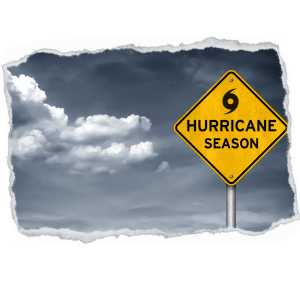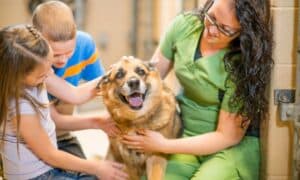Next month marks the start of the Atlantic hurricane season. Be pet-prepared with these tips.
Here are some general reminders to keep in mind this hurricane season from American Humane.
- Make sure your pet is up to date on vaccinations, especially if evacuating as your going into another jurisdiction
- Keep a copy of the veterinarian records in case you need them if you are evacuating out of town
- Microchip pets and/or put a tag on their collar with your name, current address and cellphone number.
- Bring all pets inside and ensure you have emergency supplies – extra pet food, water and a carrier ready that is large enough for your pet to turn around and lie down comfortably.
- Review your evacuation plan and have at the ready a pet disaster preparedness kit including a pet carrier, First Aid supplies, leashes, bowls, sanitation materials, chew toys and food, meds and water (minimum three days’ worth, but ideally seven to 10 days’ worth).
- If your family must evacuate, take your pets with you and leave as early as you can. Remember to take your pet disaster preparedness kit.
During the storm…. if you cannot evacuate:
- Choose a safe room for riding out the storm—an interior room without windows – and take your entire family there, including your pets.
- Stay with pets. If crated, they depend on you for food and water.
- Keep your emergency kit in that room with you (food, water, litter, meds).
- Know your pets’ hiding places. That is where they may run; keep them with you.
- Secure exits and cat doors so pets cannot escape into the storm.
- Do not tranquilize your pets. They will need their survival instincts should the storm require that.
After the storm:
- Make sure the storm has fully passed before going outside and assess damages before allowing animals out.
- Keep dogs on a leash and cats in a carrier. Displaced objects and fallen trees can disorient pets and sharp debris could harm them.
- Give pets time to become re-oriented. Familiar scents and landmarks may be altered and cause a pet to become confused or lost.
- Keep animals away from downed power lines and water that may be contaminated.
- Uncertainty and change in the environment affect animals, too, presenting new stresses and dangers. Your pet’s behavior may change after a crisis, becoming more aggressive or self-protective. Be sensitive to these changes and keep more room between them, other animals, children or strangers. Animals need comforting, too. Comfort your pet with kind words and lots of pats or hugs. If possible, provide a safe and quiet environment, even if it is not their own home.



